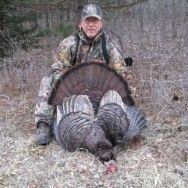Gull Lake Muskies????
-
Your Responses - Share & Have Fun :)
-
.thumb.jpg.5c1a86e9339e49e53f5bfefed2220054.jpg)
By LakeofthewoodsMN · Posted
On the South Shore... It's deer hunting season in MN and not many are out fishing. Those that are fishing are taking advantage of the unseasonably warm weather and excellent walleye and sauger bite that is happening across the lake. The best depths on the south end of LOW are 22-28 feet of water. No surprise, vertical jigging with frozen emerald shiners is the program for most anglers. Anglers are going through a lot of frozen emerald shiners as the walleyes and saugers are all mixed sizes. You will catch small ones and your eaters. Depending upon where on the lake you are fishing, some slots and big trophies are in the mix as well. Anglers are also reporting very good numbers of jumbo perch this fall. Watch out for an occasional pike or even lake sturgeon mixed in with the walleyes. Good numbers of fish are staged in great spots for the upcoming ice fishing season. On the Rainy River... Good numbers of shiners again in the river this past week. Typically, if there are shiners, there will be walleyes, and there definitely are. Walleyes are coming from various spots from Four Mile Bay to Wheeler's Point, to Baudette all the way to Birchdale. With so many anglers taking advantage of the deer hunting season, there are not a lot of boats on the river. Walleyes are being caught in 10-25 feet of water in various stretches of the river. The bait and consequently, walleyes, are moving around. Once you find some fish, you will be rewarded. Jigging with live or frozen emerald shiners is the way to go. Some anglers are also still trolling crankbaits upstream to cover more ground and find fish. Both methods are producing solid results. Sturgeon fishing remains strong. The catch-and-release sturgeon fishing is open into the spring when it changes to the "keep season" on April 24th. Up at the NW Angle... For those not in the woods hunting, fall fishing continues to be excellent. It is areas with structure holding walleyes in this part of the lake. Points, neck-down areas with current, shoreline breaks, and transition zones from rock to mud are all productive locations for walleye right now. A nice mixed bag with perch, pike and crappies being caught as well. Good muskie fishing with the colder water temps and shorter days. Some big fish and some good numbers are being caught amongst the islands. Both casting and trolling is getting it done. -

By monstermoose78 · Posted
In October but I used get more of them in Ely. -

-

-

By ozzie · Posted
Yes. No lightning strikes in the area on Saturday and a tree was burning. The squirrel hunters have been a nuisance this year with more activity in our area then we have ever seen. This was the 3rd fire in the section of woods in the past 2 weeks. Most definitely not caused by natural events. -

By leech~~ · Posted
Stop, trying to make everybody feel bad that not in the woods! 😟 😆 -

By Wanderer · Posted
Haha! No… In other news: All the cell cams users that I talk with are seeing some daylight movement of adult bucks since yesterday. No deer hunters want to be at work right now. -

By SkunkedAgain · Posted
The water temps on the west end Friday were 45 in HeadOLakes and 44 in the smaller bays. -

By leech~~ · Posted
You didn't Sluice um! 😆 I was driving 94 passed Runnings in Monticello yesterday late after noon and saw a huge, thick dark brown 8 point running alone the freeway with its tongue out. Thinking he was after a girlfriend! 😜 -

-

Recommended Posts